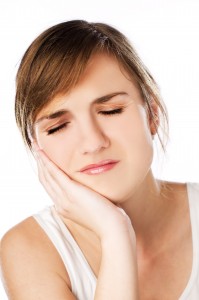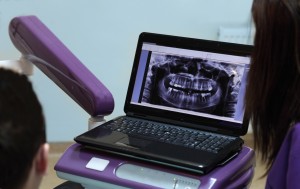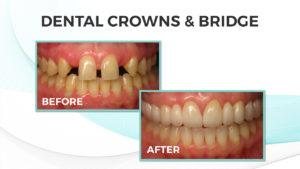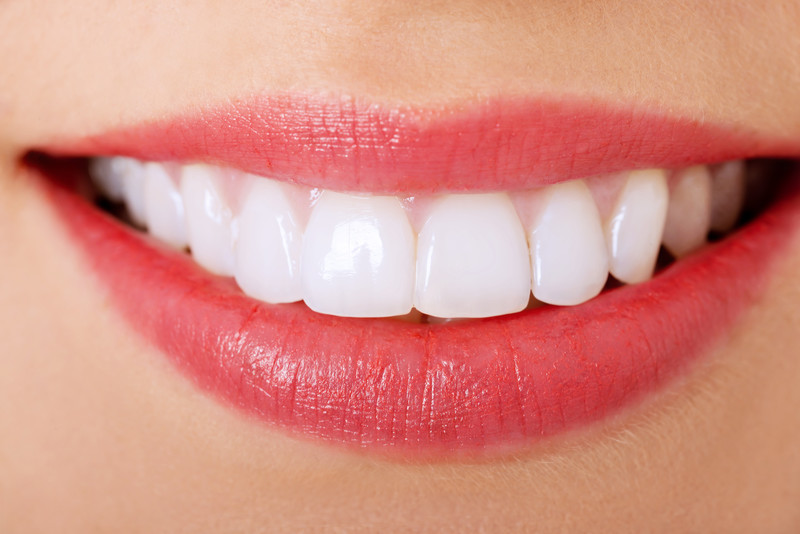TMJ / TMD

At Chesterfield Family Dental we specialize in a lot of dental treatments and with that comes treatment for TMJ pain. TMJ stands for temporomandibular joint and when you have pain or problems associated with it, it’s called TMD, or temporomandibular joint disorder. Without treatment, you can experience a significant amount of pain in your jaw, neck, the sides of your face and even suffer from migraines. Luckily, our Springfield dentists are here to help you with our different TMJ treatment options. Find out more about TMJ and the different treatment options we have available.
What is TMJ?
Your TMJ is the hinge that connects your lower and upper jaw and TMD occurs when this isn’t working correctly. This hinge is one of the more complex parts of your body. It’s responsible for the moving your lower jaw backward, forward and side-to-side. When problems occur in these ligaments, muscles, bones, and discs, this is called TMJ or TMD. When you have TMJ, you will notice that your jaw clicks, pops or even gets stuck for moments. Dr. Buzbee will have to work with you to figure out the cause of the misalignment.
Symptoms of TMD
There are a lot of different symptoms of TMD. Some patients of ours don’t even know that TMD is a real problem and think that their pain is normal. It’s hard to diagnose TMD because sometimes other problems cause similar symptoms. A complete and accurate diagnosis will involve taking x-rays, a dental exam, and examining your dental and medical history. It’s been found that TMD can be temporary or last for several years. It can affect one or both sides of your face and mostly affects women over the age of 40. Unfortunately, the pain will most likely not go away without treatment.
Common Symptoms:
- Jaw, face or ear pain
- Earaches
- Headaches or migraines
- Pressure and/or pain behind the eyes
- Popping or clicking noises when opening and closing the mouth
- Lockjaw, or a jaw that gets stuck in place
- Jaw tenderness
- Trouble biting or chewing
- Facial swelling
- A sudden change in the way your upper and lower teeth fit together (dental occlusion)
- Dizziness
- Hearing problems
- Upper shoulder pain
- Ringing in the ears (tinnitus)
- Tired feeling in the face
The Cause of TMD
There are a lot of different factors that can cause TMD, unfortunately, there is no known one cause. However, there are a few aspects that have been known to contribute to TMJ pain. One of the causes can be from jaw, head or neck injury like whiplash or a hard hit. This can lead to TMD. Other causes include bruxism, or the clenching or grinding of your teeth. This will put pressure on the joint and therefore cause pain. Another cause is from the soft cushion or disc moving between the socket and ball of the joint. TMJ can also be caused by arthritis in the joint or from stress that leads to clenching or tightening your jaw muscles. Luckily, we can help treat most of these causes of TMJ in Springfield.
TMJ Treatment
At Chesterfield Family Dental, we offer different TMJ treatments depending on what we determine is the cause of your TMD. After your complete dental exam and assessment, we can determine the best treatment option for you. If the cause of your pain is from grinding or clenching your teeth, we will recommend a night guard to wear while you sleep so you can stop damaging your teeth and stop this habit. After a few weeks, if this is the case, you will notice that your pain subsides.
Other treatment options may involve wearing an oral appliance at night to help align your jaw properly. If we determine your TMJ is from uneven teeth or misaligned teeth, we can recommend braces or dental crowns to sort out this problem. For severe cases, surgery is needed, but this is rare.
If we find that your TMJ is caused by stress, we will recommend learning relaxing techniques to help lessen the tension in your jaw. Some patients also find relief from getting BOTOX injections in their jaw to help relax the muscles in their jaw. Once we determine the cause of your TMJ, we can give you different options to try until your pain disappears.
How to Alleviate TMD Symptoms
With treatment, your TMJ pain won’t go away overnight. This is why it’s important to know about the different ways you can alleviate the pain. First of all, you can try applying moist heat to your jaw or using a heating pad when your pain is unbearable. If the heating pad doesn’t work, you can try ice packs to help with swelling and to help numb the area.
You can also take medications like muscle relaxers, over the counter pain medicine, anti-inflammatory drugs as well as aspirin. Another way to alleviate the pain is by wearing a night guard. This will prevent you from clenching or grinding your teeth which is a main cause of TMJ. Lastly, you can learn to relax. Muscle tension can do wonders on your body like causing painful headaches and TMJ. You can learn to relax by doing something to relieve your stress every day like exercise or doing a fun hobby. You can also seek out counseling to help you better deal with stress. In some cases, anti-anxiety medicine or anti-depressants might be a better help.
When your pain is acting up, you can also help relieve your pain or deal with symptoms better by eating only soft foods that don’t require a low of hard chewing. Avoid foods that require too much chewing and instead opt for soft foods like yogurt, mashed potatoes, scrambled eggs, cooked vegetables, smoothies, and soups.
Seek TMJ Treatment in Springfield Today
If you suffer from TMJ pain and feel that it’s time to have your pain evaluated by a dentist with expertise in TMJ treatment, it’s time to schedule a consultation at Chesterfield Family Dentistry. Our Springfield dentist can help diagnose the cause of your pain and provide you with different treatment options. If you would like to schedule an appointment, give our Springfield dental office a call today or fill out our online contact form.









